The global electric vehicle charging cable market was valued at $0.67 billion in 2021, and is projected to reach $3.45 billion by 2031, growing at a CAGR of 18.1% from 2022 to 2031.
An electric vehicle (EV) charging cable is the connecting cable between the charging station and the EV that supplies electricity for the recharging of EVs such as battery-electric cars (BEVs) and plug-in hybrid vehicles (PHEVs). These cables are made up of three parts, including a connector plugged into the vehicle, a length of wire, and another plug connected to a power source. It primarily collects AC power from the wall socket and converts it into DC power. Moreover, these charging cables have a liquid cooling system that allocates heat consistently and reduces the risk of overheating. Meanwhile, the water–glycol mixture is the most widely used coolant for such cooling systems, owing to its ease of maintenance and environmental-friendly features. In addition, there is a controller present that monitors the temperature and regulates the flow of the coolant.
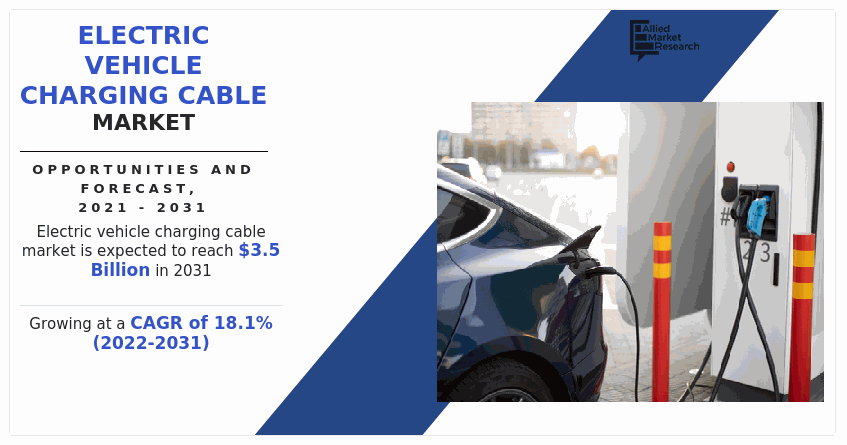
At present, the development of fast charging technology as well as effective charging times & capacity with the adoption of coiled charging cables & DC charging cables are predicted to be in high demand, thereby propelling the EV charging cable industry. For instance, in November 2019, BRUGG eConnect, the cables & connectors division of BRUGG Group AG launched high-performance charging cable, the PURWIL Connect 850+ Cooled, that can deliver DC electricity at 1,000 volts and up to 850 amps. It offers fast-charging capability to charge next-gen high-capacity EVs within 8 minutes or less with innovative in-wire cooling technology.
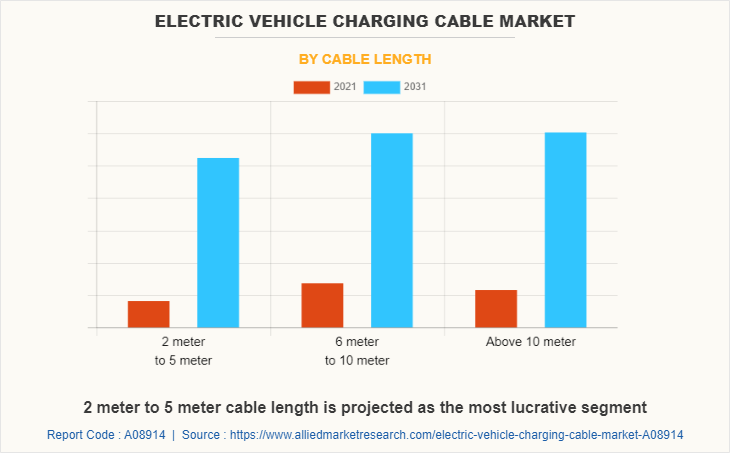
Factors such as increase in adoption of EVs have amplified the EV charging cables market. In addition, government concerns over reducing carbon footprints are driving the market of EV charging cables. Moreover, the demand for fast charging cables would proliferate the market growth. However, high operational costs of EV charging cables and adoption of wireless EV charging technology hamper the market growth. On the contrary, rocketing infrastructural developments of public EV charging station and advancements in EV charging cable technology are expected to propel the growth of the EV charging cable market growth.
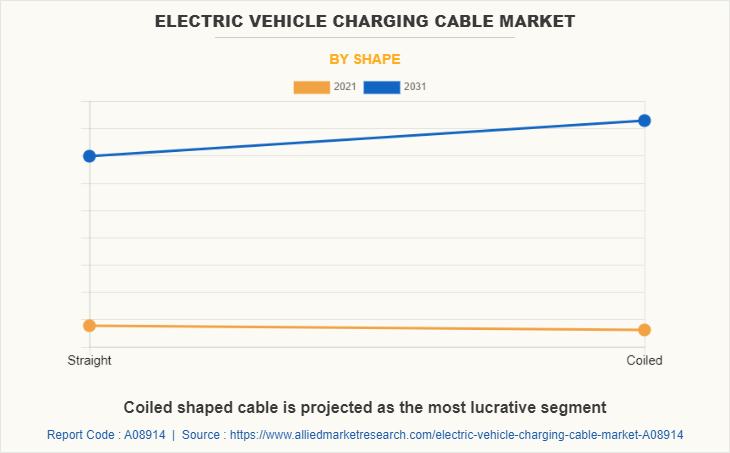
The global electric vehicle charging cable market is segmented into power type, application, cable length, shape, charging level, and region. Depending on power type, the EV charging cable market is categorized into alternate charging (AC) and direct charging (DC). By application, it is segregated into private charging and public charging. On the basis of cable length, it is fragmented into 2–5 meters, 6–10 meters, and above 10 meters. As per shape, it is bifurcated into straight and coiled. According to charging level, it is differentiated into level 1, level 2, and level 3. Region wise, the market is analyzed across North America, Europe, Asia-Pacific, and LAMEA.
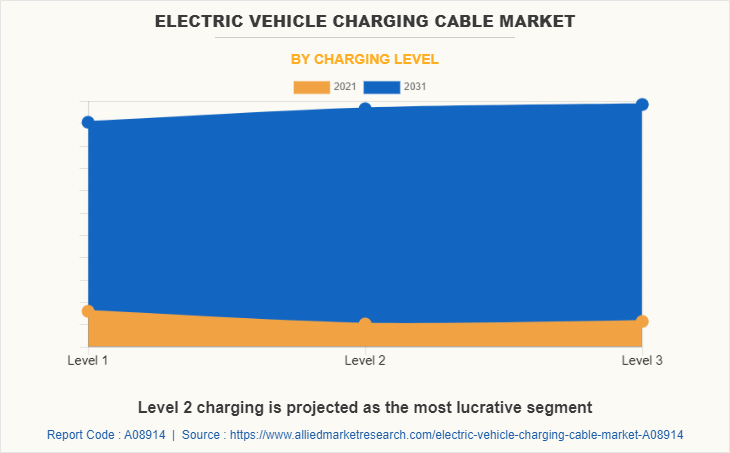
Aptiv, Besen International Group Co., Ltd., BRUGG Group AG, Chengdu Khons Technology Co., Ltd., DYDEN CORPORATION, Guangdong OMG Transmitting Technology Co. Ltd., Leoni AG, Phoenix Contact, Sinbon Electronics, and TE Connectivity are some of the leading key players operating in the EV charging cable market.
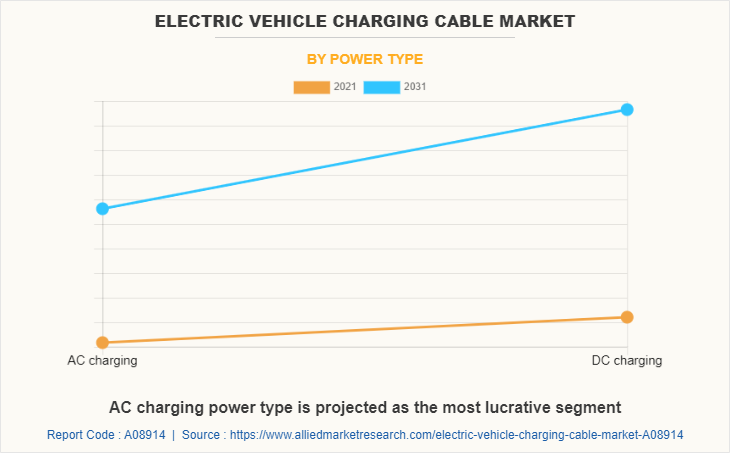
Increase in adoption of electric vehicle (EV)
Electric vehicles (EVs) are experiencing a rise in popularity over the past few years as the technology has matured & costs have declined, and support for clean transportation has promoted awareness, increased charging opportunities, and facilitated EV adoption. Furthermore, rise in vehicle emission concerns and depletion of nonrenewable energy resources have attracted the attention of several governments to invest in electric vehicles. European countries are among the frontrunners in adopting electric mobility. According to the European Environment Agency, in 2020, electric car registrations surged, accounting for 11% of newly registered passenger cars in which battery electric vehicles (BEVs) accounted for 6% of total new car registrations, while plug-in hybrid electric vehicles (PHEVs) represented 5%. Even subsidies for purchasing electric cars have led consumers to adopt EVs. The growing inventory of EVs requires established power grids & charging terminals to ensure the smooth operation of the electric vehicles. Hence, increase in adoption of EVs worldwide is expected to drive the market growth of the EV charging cable market.
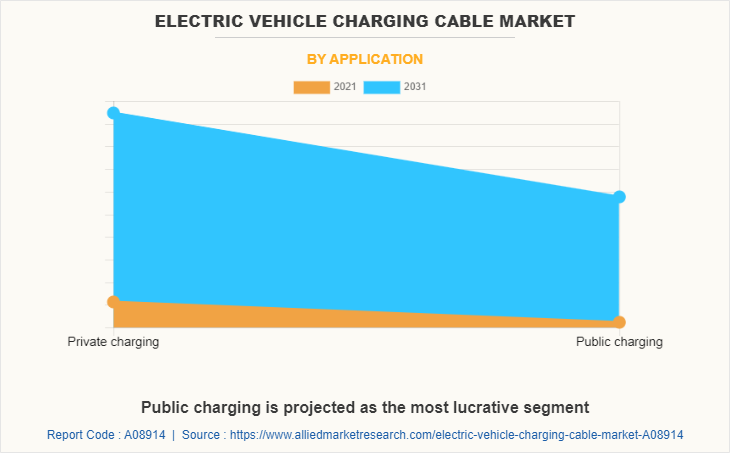
Government concerns over reducing carbon footprints
Rapid urbanization has increased the number of vehicles and traffic congestion, which led to increased air pollution. According to the Centre of Science and Environment in India, air pollution is responsible for 12.5% of all deaths in India and kills an average of 8.5 out of every 10,000 children in India before they turn five. Thus, increase in pollution levels has propelled the public to adopt measures to curb the pollution level. Hence, governments of developed countries have established initiatives to reduce vehicular and industrial pollution to reduce individual carbon footprints. Moreover, governments of various countries such as the U.S., Germany, and India is launching programs and policies related to vehicle emissions. For instance, in Maharashtra (India), the state’s new EV policy aims to have a 10% share of EVs among total vehicle registrations by 2025 to reduce vehicular emissions, as stated by the Director of Maharashtra Pollution Control Board (MPCB).
Furthermore, the Environmental Protection Agency (EPA) finalized federal greenhouse gas (GHG) emissions standards for passenger cars and light trucks in the U.S. through 2026. The final standards leverage advances in clean car technology to unlock $190 billion in net benefits to Americans, including reducing climate pollution, improving public health, and saving drivers money at the pump. Hence, such government concerns & policies to reduce the carbon footprints with the adoption of EVs propels the demand for EV charging cables, thus contributing toward the electric vehicle charging cable market growth.
Adoption of wireless EV charging technology
Wireless car charging is an enhanced version of smartphone charging with several differences. It allows an EV to automatically charge without the need for a cable. Wireless charging of EVs is expected to be driven by surge in demand for vehicle safety, increase in demand for premium segment vehicles, development of semi-autonomous & autonomous vehicles, and rise in adoption of EVs. Such improvements in wireless EV charging hamper the growth of the EV charging cables market. For instance, many EV buses use this technology for stationary EV charging in countries such as China and Germany. Similarly, Sweden developed an electrified road that can charge vehicles. This will be a significant factor affecting the market for wired EV charging.
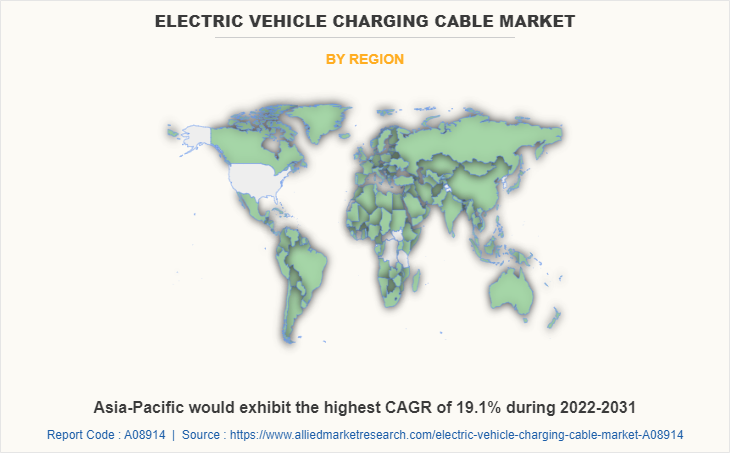
Rocketing infrastructural developments of public EV charging station
Creating public charging infrastructure can be daunting and expensive. It involves disrupting already congested travel corridors and finding suitable charging spaces and substantial outlays to achieve a decent public EV charging infrastructure network. This needs to be supplemented with alternate solutions such as installing charging points within residential complexes, housing societies (including for visiting parking slots), shopping malls, parking lots, railway stations, offices, and small shops. Meanwhile, governments worldwide are focusing on infrastructural development for the EV landscape and thereby promoting EV use. Owing to heavy investment made by governments, public charging stations are installed in every possible public place. For instance, in April 2022, automobile manufacturer BYD India partnered with Chargezone, Volttic, and Indipro to set up charging infrastructure for EVs in India. This tie-up addresses the charging needs of the company’s electric multipurpose vehicles across multiple cities and major highways in the country. In addition, in June 2021, the Canadian Government announced an investment of about $2.35 million to install EV fast chargers in the country. Moreover, governments in countries such as China and France are subsidizing the construction of public charging stations, further expanding the EV charging cable market. Thus, rise in investments made by countries in developing public EV charging station infrastructure is expected to offer remunerative opportunities for the growth of the EV charging cable market growth during the forecast period.
Key Benefits For Stakeholders
- This report provides a quantitative analysis of the market segments, current trends, estimations, and dynamics of the electric vehicle charging cable market analysis from 2021 to 2031 to identify the prevailing electric vehicle charging cable market opportunities.
- The market research is offered along with information related to key drivers, restraints, and opportunities.
- Porter's five forces analysis highlights the potency of buyers and suppliers to enable stakeholders make profit-oriented business decisions and strengthen their supplier-buyer network.
- In-depth analysis of the electric vehicle charging cable market segmentation assists to determine the prevailing market opportunities.
- Major countries in each region are mapped according to their revenue contribution to the global market.
- Market player positioning facilitates benchmarking and provides a clear understanding of the present position of the market players.
- The report includes the analysis of the regional as well as global electric vehicle charging cable market trends, key players, market segments, application areas, and market growth strategies.
Electric Vehicle Charging Cable Market Report Highlights
| Aspects | Details |
| By Cable Length |
|
| By Shape |
|
| By Charging Level |
|
| By Power Type |
|
| By Application |
|
| By Region |
|
| Key Market Players | Prysmian S.p.A., Dyden Corporation, Aptiv Plc, Manlon Polymers, Phoenix Contact, Guangdong OMG Transmitting Technology Co., Ltd., EV Cables UK, Coroplast Fritz Müller GmbH & Co. KG, Besen International Group, Leoni AG, Brugg Group, TE Connectivity Ltd., AG Electrical Technology Co, Chengdu Khons Technology Co., Ltd., Sinbon Electronics |
Analyst Review
The current business scenario of the EV charging cable market has witnessed significant growth owing to the evolving consumer preferences and technological advancements in the EV industry significantly. Furthermore, the immense development of electric car component manufacturers worldwide is also driving the EV charging cable market. Europe is expected to justify a significant share of the global EV charging cable market due to the availability of various automakers and top-tier manufacturers in Europe, such as Phoenix Contact and Leoni AG. They have essential facilities that conduct research and development on the EV charging cable, which is expected to accelerate the EV charging cable market across Europe.
In accordance with the International Energy Agency (IEA), the electricity distribution companies and oil & gas players are developing solutions and entering into partnerships in the EV charging infrastructure space. In 2019, there were about 7.3 million chargers worldwide, of which about 6.5 million were private, light-duty vehicle slow chargers in homes, multi-dwelling buildings and workplaces. According to insights gathered from primary sources, the demand for EV charging cables is accelerated with significant government initiatives and substantial investments in charging infrastructure development. For instance, the central government of China also supports municipalities in the deployment of public battery recharge infrastructure by subsidizing the construction of charging stations. In France, financial incentives are offered through tax credit equivalent to 30% of a home charger or subsidies on the installation of chargers in residential areas or workplaces.
Among the analyzed regions, Asia-Pacific is the highest revenue contributor, followed by Europe, North America, and LAMEA. On the basis of forecast analysis, Asia-Pacific is expected to lead during the forecast period, due to increase in concerns related to emission of hazardous pollutants fuels the adoption of electric vehicles in developing countries across the Asia-Pacific.
Introduction of different levels of EV chargers are the upcoming trends in the market.
Installation of EV charger cable in public as well as private charging is the leading application of Electric Vehicle Charging Cable Market
Asia-Pacific is the largest regional market for Electric Vehicle Charging Cable
The market is projected to reach $3.5 billion by 2031.
Numerous companies have been operating in the market and the detailed description of the same can be obtained through sample provided from AMR
Loading Table Of Content...


